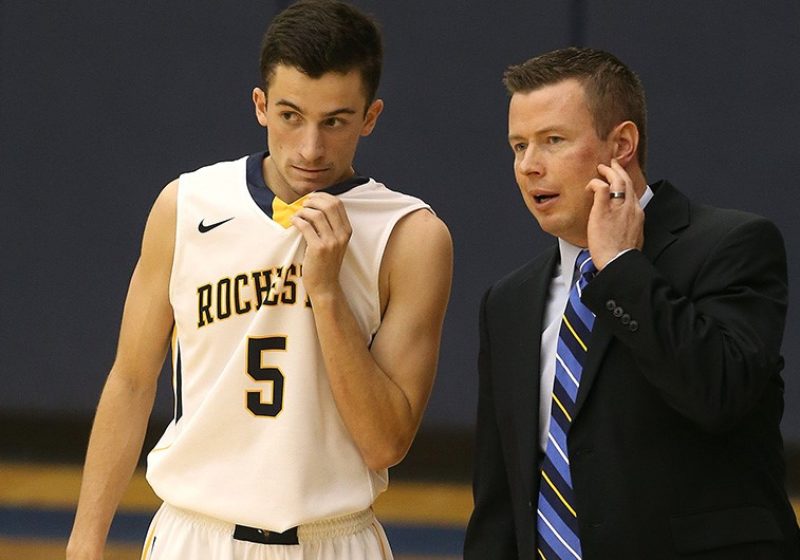UR Men’s Basketball Head Coach Luke Flockerzi has maintained the successful tradition and culture of URBB during his seven years in charge. His humility, integrity, and ability to learn from his experiences have driven his professional development and success at every stage of his career.
Flockerzi played basketball and studied psychology at Grinnell College. His exposure to the high quality athletic department management—in particular, the athletic director—inspired him to look into schools to study sports management. He did just that, and ended up attending Amherst. It was here he would first find interest in coaching.
“My college coach at Grinnell played against the current Amherst College coach and encouraged me to reach out and see if I could volunteer with the team,” Flockerzi said.
He volunteered with the team for a year and thoroughly enjoyed the experience.
“It was then […] that I really could finally put my finger on what I was most passionate about,” he said.
Flockerzi was interested in working in the higher education environment because of his positive experiences as a student-athlete.
Upon graduation, Flockerzi joined the coaching staff at Amherst in 2001. For the next four years, he worked on a staff guiding Amherst to NCAA tournament appearances each year, including two Final Four runs.
“I felt like when I was at Amherst as an assistant coach I could really impact the players and help them have a rewarding experience,” Flockerzi said of his experience. “It’s been my most central goal as a coach. I want every everyone to graduate in four years feeling that same rewarding experience and takeaways from what I did at that time.”
In 2003, Flockerzi was named the AFLAC National Assistant Coach of the Year.
He would then go on to become an assistant coach at UR for a year before taking over as the head coach of Skidmore College, where he helped the team rise from a 6–19 record to 16–10 in just three years.
Then, in 2010, the head coaching position at UR opened up, and Flockerzi enthusiastically accepted the position.
“The structure [of the program] and the league and everything the University of Rochester has to offer was a great addition to what I’ve experienced,” he said.
In his seven years here, his teams have accumulated a record of 122–62, including three NCAA tournament appearances.
Although his teams have tremendous on-the-court success, Flockerzi is chiefly concerned with his players’ development and value systems to prepare them for a professional career, and he and his coaching staff encourage campus involvement.
“We want our guys to have a college experience outside of just school and basketball,” he said.
Incoming freshmen players have a designated study hall to make sure they are committed and performing well academically.
When looking for players, Flockerzi said he looks for guys who are “going to leave it on the floor for four years to become the best player and student they can be.”
Flockerzi realized his own potential as a professional by working to come to UR, a high quality basketball program, and he expects the same from his players. He leads by example on and off the court, helping players learn life lessons that are applicable outside of basketball.
“I’ve had a lot of positive influences in my life who have helped shape me. I always say I am an amalgamation of all my experiences,” Flockerzi said.
He finds meaning in everything he does, developing players with determination and integrity, and leaving a lasting imprint on the lives of everyone he works with.





